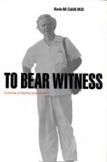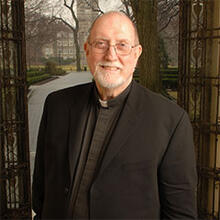Specialist to the World
It was not my first visit to Kevin Cahill, M.D., a tropical medicine specialist based in New York, but it was probably the most memorable. Returning from Africa to recuperate from both hepatitis-A and food poisoning, I had to be driven to his Fifth Avenue office, too weak to go on my own by public transit. It was a September day in 1982, warm enough to merit air conditioning in his office, but I felt more than usually cold as he put me, in my birthday suit except for a skimpy robe made out of paper, through a physical examination.
Suddenly the intercom notified him that he had to answer an urgent phone call from Beirut, a city still reeling from the recent assassination of the then president-elect of Lebanon. I grew colder and colder sitting on the examination table as the phone call went on and on out of earshot. He eventually did return, his forehead wrinkled with concern over what he had just heard, and found me curled up in a fetal position on the examination table, trying to keep warm. The tragic situation of Lebanon in 1982 put my own temporary health problems into realistic perspective.
That memory catches in a nutshell the reality of Dr. Cahill’s life as a medical doctor and a humanitarian, a career that has brought him from the Irish-American Bronx of half a century ago to such distant shores as Nicaragua, Somalia, Sudan, Egypt and India. In To Bear Witness Cahill has gathered together occasional writings published since 1959, when he first visited Calcutta as a medical student, to 2005, when he wrote down his memories of his dealings with Pope John Paul II after the assassination attempt in 1981.
Cahill does not fear controversy, and his spirited defense of the Sandinista revolution in Nicaragua a quarter of a century ago demonstrates the doctor’s high-minded idealism. His genuine love for third world populations, and especially the marginalized poor of that Central American nation, as well as his sensitivity to the medical and cultural realities of desperate populations in countries that have fallen apart like Somalia and Sudan, indicate that Cahill is not only a trained medical practitioner but also a born anthropologist, able to adjust his medical practice to varying cultural and economic settings.
Early in this collection of essays, long and short, Dr. Cahill meditates with great insight on his family’s Irish roots as the source for his “solidarity with the outcasts of society.” Would that more of his fellow Irish Americans could share his insight into the situation of the world’s downtrodden populations! The first guerrilla war of the 20th century was the Irish War of Independence, and Cahill does not shrink from seeing the connections between the Irish experience—and especially the recent Northern Irish experience—of oppression and the denial of basic human rights by ruling elites elsewhere in the world, all too often supported by the U.S. government.
There is wit in this charming book, best exemplified by his recollection of receiving from his parents for his 14th birthday a book entitled Short Sports Heroes. (Dr. Cahill is 5’6” in his shoes.) There is profundity as well. I particularly liked the address he gave at Georgetown University in 1988, in which he said The Collected Poems of W. B. Yeats—a book given to him by his parents when he was 12—has remained his vade mecum for all the years since then. Although Cahill recognizes the eccentricities of Yeats’s own politics, he still thinks with particular fondness of the poet’s scorn for lying politicians: “For how can one compete,/ Being honour bred, with one/ Who, were it proved he lies,/ Were neither shamed in his own/ Nor in his neighbours’ eyes?” The relevance of those lines to recent American history needs no elaboration.
In addition to continuing his busy practice as a tropical medicine specialist, Cahill is director of the Institute of International Humanitarian Affairs at Fordham University. From that podium he has been able to launch a series of important international symposia on the need for concerted humanitarian action to intervene in such international tragedies as those in Rwanda, Bosnia, East Timor and Iraq. “Preventive diplomacy,” a term he coined, offers a viable alternative to strictly military intervention in international disasters.
I recommend this book not only to anyone concerned with the appropriate moral responses to the tragedies that plague so much of the developing world, but also to any young man or woman considering a career of medical service to the marginalized. Along with Tracy Kidder’s Mountains Beyond Mountains (2003), the evocation of the international medical vocation of Dr. Paul Farmer, Dr. Cahill’s memoir deserves an honored place on the bookshelves of anyone thinking of a career in humanitarian action.
This article also appeared in print, under the headline “Specialist to the World,” in the February 20, 2006, issue.








